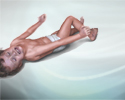Cysticercosis
Cysticercosis is an infection by a parasite called Taenia solium (T solium). It is a pork tapeworm that creates cysts in different areas of the body.
-
Causes
Cysticercosis is caused by swallowing eggs from T solium. The eggs are found in contaminated food. Autoinfection is when a person who is already infected with adult T solium swallows its eggs. This occurs due to improper hand washing after a bowel movement (fecal-oral transmission).
Risk factors include eating pork, fruits, and vegetables contaminated with T solium as a result of undercooking or improper food preparation. The disease can also be spread by contact with infected feces.
The disease is rare in the United States. It is common in many developing countries.
-
Symptoms
Most often, the worms stay in muscles and do not cause symptoms.
Symptoms occur depending on where the infection is found in the body:
- Brain -- seizures or symptoms similar to those of a brain tumor
- Eyes -- decreased vision or blindness
- Heart -- abnormal heart rhythms or heart failure (rare)
- Spine -- weakness or changes in walking due to damage to nerves in the spine
-
Exams and Tests
Tests that may be done include:
- Blood tests to detect antibodies to the parasite
- Biopsy of the affected area
- CT scan, MRI scan, or x-rays to detect the lesion
- Spinal tap (lumbar puncture)
- Test in which an ophthalmologist looks inside the eye
-
Treatment
Treatment may involve:
- Medicines to kill the parasites, such as albendazole or praziquantel
- Powerful anti-inflammatories (steroids) to reduce swelling
If the cyst is in the eye or brain, steroids should be started a few days before other medicines to avoid problems caused by swelling during antiparasitic treatment. Not all people benefit from antiparasitic treatment.
Sometimes, surgery may be needed to remove the infected area.
-
Outlook (Prognosis)
The outlook is good, unless the lesion has caused blindness, heart failure, or brain damage. These are rare complications.
-
Possible Complications
Complications may include:
- Blindness, decreased vision
- Heart failure or abnormal heart rhythm
- Hydrocephalus (fluid buildup in part of the brain, often with increased pressure)
- Seizures
-
When to Contact a Medical Professional
If you have any symptoms of cysticercosis, contact your health care provider.
-
Prevention
Avoid unwashed foods, do not eat uncooked foods while traveling, and always wash fruits and vegetables well.
References
White AC, Brunetti E. Cestodes. In: Goldman L, Cooney KA, eds. Goldman-Cecil Medicine. 27th ed. Philadelphia, PA: Elsevier; 2024:chap 325.
White AC, Cabada MM, Fischer PR. Cysticercosis. In: Kliegman RM, St. Geme JW, Blum NJ, Shah SS, Tasker RC, Wilson KM, eds. Nelson Textbook of Pediatrics. 22nd ed. Philadelphia, PA: Elsevier; 2025:chap 349.













